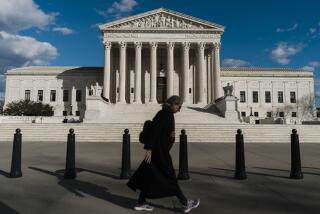Court Expands U.S. Judges’ Power to Void Confessions; Trial by Two States Allowed
- Share via
WASHINGTON — The Supreme Court ruled Tuesday that federal judges hold far-reaching power to throw out confessions by criminal defendants that state courts have found were voluntary and admissible as evidence.
In an 8-1 decision, the justices said that federal courts, in reviewing appeals, must make their own independent finding on the voluntariness of confessions rather than presuming that the state court determination was correct.
The ruling resolves conflicting decisions by lower courts and gives defendants greater ability in federal habeas corpus proceedings to challenge their convictions on the grounds that their confessions were coerced.
Trial by Two States
In another criminal case, the court made a new exception to the constitutional prohibition against double jeopardy, ruling 7 to 2 that a defendant may be tried by two states for the same criminal act.
The court has long held that the federal government and a state, as “dual sovereigns,” both may prosecute for a single act that violates federal and state laws--and the same principle allows successive prosecutions by two states, the justices said.
In the confessions case, Justice Sandra Day O’Connor, writing for the majority, said that, although federal courts should give “great weight” to state judicial findings, the question of whether a confession meets the constitutional standards of due process “is a matter for independent federal determination.”
The justices ordered a federal appeals court in Philadelphia to conduct further hearings to decide whether a confession by a man suspected of killing a 17-year-old New Jersey girl had been made voluntarily.
‘Mental Problem’
Frank M. Miller Jr. was convicted of the mutilation killing of Deborah Margolin of rural East Amwell Township in 1973. In a 58-minute interrogation, a state police detective suggested to Miller that, because he had a “mental problem,” he was “not responsible” for the crime. The detective promised that, if Miller would talk, he would “get the proper help” from a psychiatrist.
Miller finally made a full confession and was convicted. He later challenged the admission of the confession, but the New Jersey Supreme Court rejected his appeal, holding that his statements had been made voluntarily. A federal District Court refused to grant Miller a hearing, and a federal appeals court upheld the conviction, noting that it had only limited authority to review the state court finding on the confession.
The Supreme Court, in its decision (Miller vs. Fenton, 84-5786), did not address the question of whether the confession had been properly admitted, leaving that issue for the appeals court to decide in subsequent proceedings.
Justice William H. Rehnquist dissented, saying that he believes the appeals court already had adequately evaluated the admissibility of the confession.
“It is unfortunate that (Miller’s) challenge to his conviction for a murder which occurred 12 years ago should be the subject of additional and unnecessary litigation and delay,” he said.
In the double jeopardy case, the court rejected an appeal by Larry Gene Heath of Russell County, Ala., who was twice prosecuted in the murder-for-hire killing of his wife in 1981. Rebecca Heath, then nine months pregnant, was kidnaped by two men from her residence in Alabama and was found shot to death across the border in Georgia.
Heath confessed to paying the killers $2,000 and pleaded guilty to a murder charge in Georgia in exchange for a sentence of life imprisonment--which could have resulted in parole in seven years. Alabama authorities then charged him with murder during a kidnaping, and he was convicted and sentenced to death.
‘Sovereign Interest’ Cited
Justice O’Connor, in the majority opinion, said that in such cases a state must be free to decide whether another state’s prosecution has satisfied “its legitimate sovereign interest.”
“To deny a state its power to enforce its criminal laws because another state has won the race to the courthouse would be a shocking and untoward deprivation of the historic right and obligation of the states to maintain peace and order within their confines,” O’Connor said.
Justices William J. Brennan Jr. and Thurgood Marshall dissented (Heath vs. Alabama, 84-5555).
More to Read
Sign up for Essential California
The most important California stories and recommendations in your inbox every morning.
You may occasionally receive promotional content from the Los Angeles Times.













